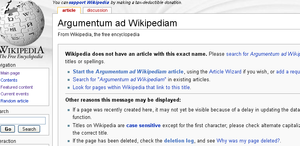Argumentum ad Wikipediam

“The Argumentum ad Wikipediam is God's favourite Argument.”
“Wikipedia is fine! It's the world that is imperfect.”
The argumentum ad Wikipediam[3] is a logical fallacy. Like argumentum ad hominem ("argument to the man," a personal attack) and argumentum ad populum ("argument to the people," an appeal to fashion), the ad Wikipediam fallacy happens when someone trots out Wikipedia as though it were a definitive source of the truth. This occurs in political debate, mostly by supporters of Barack Obama who cannot argue the facts but just want a bigger government check on the third of the month. The names of these fallacies were all translated into Latin so those guys couldn't figure out how to use them, but they did anyway.
Background[edit | edit source]
Wikipedia, not unlike Uncyclopedia, is a body of articles that anyone is free to edit. This includes Earth's 7 billion human beings, the 2 billion of them with access to a computer, the 800 million of those who have never achieved anything more noble than petty vandalism, and the 500 million who would not recognize a natural truth if it flew into their gaping, incredulous mouths.
Consequently, Wikipedia is not the word of God. And there are two reasons for this:
- In the short term, people can type all manner of assertions into Wikipedia, which will survive until someone else deletes them, a process whose speed depends on level of "offense" given. A recent example is that Rush Limbaugh said on his radio show that slavery "got the Darkies off our streets so we can take our evening strolls," a short-lived factoid that induced the National Football League to drop, like a hot watermelon, him and his equally bulging bankroll eager to buy into a franchise.
- In the long term, an orthodoxy has developed. It is more orderly and reasoned but equally cavalier with the truth. The talk page criticizes editors for citing in-the-tank sources such as Fox News, over balanced and objective reporting such as MSNBC, Pravda, and autobiographies. It hand-wrings about the fact that some editors even dare to debate the orthodoxy. What do you think this is, a partisan battleground?
The result is articles that assert that Canada doesn't prohibit the private practice of medicine, that Islam has nothing to do with Islamic terrorism, and that Republican celebrities contain butt-chips personally implanted by Satan. You can find a seemingly rational discussion of Islamophobia (the irrational fear of being beheaded in jihad) and even "homophobia" (literally, that any opposition to law changes, even those that give special rights to gays, reflects a phobia that the opponent is himself gay, won't admit it, and presumably wants bad things to happen to himself).
Wikipedia, then, is unlike Uncyclopedia in that the great majority of the crap is not properly labeled as crap.
What isn't an "ad Wikipediam"[edit | edit source]
Wikipedia is good for plenty of things, including the following:
- Discographies of rock bands
- The plot of each episode of Star Trek, even the original series
- Dates, vote totals, formal citations of bills and laws, and other things that no one is shameless enough to falsify.
You can even use Wikipedia as a research tool, if your target is a right-wing politician. His biography on Wikipedia is a complete guide to every effective or potentially effective personal scandal in his career, in chronological order.
However, if your goal is to discredit a left-wing politician, you are S.O.L. (That's Latin too.) Her Wikipedia biography will merely describe the tax increases and Draconian curtailments of personal rights that she "was forced to impose," without a word on the time she refused to take the Breathalyzer. (As though that would prove anything the morning after the hit-and-run accident.) And her chief-of-staff spent two years in prison based on an "accusation"--No mention of a trial or a guilty verdict.
What is an "ad Wikipediam"[edit | edit source]
- Related Uncyclopedia style guide: Other pompous ways to start a sentence
The argumentum ad Wikipediam is used by certain political adversaries--notably, gadflies, housewives, and lawyers who are paid by political parties to dress in worn blue jeans and purple T-shirts and pretend they are ignorant day laborers. These polemicists like to say cute things such as, "The science is settled" and "We all know that...." In other words, they use language not to say anything, much less to measure reality, but to shush you up. And a favorite of theirs is to read you part of a Wikipedia article. They might have written it, or they might not have. But there is no rebuttal; because, after all, that's what's in Wikipedia.
References[edit | edit source]
The legal status of this page is hereby marked with animus manendi pro tempore as the curia advisari vult pending affidavits de lege ferenda.
The Department has, by the power vested in itself, declared this page solely exempli gratia, as specified in Statute 1.3-37: "Cessante ratione legis cessat ipsa lex."
